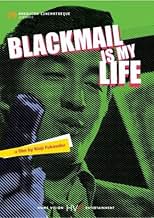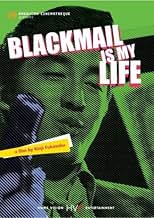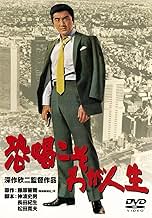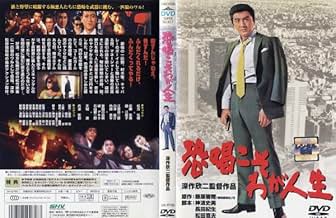Ajouter une intrigue dans votre langueA pungent, extremely entertaining tale of hedonistic, amoral blackmailer Matsukata.A pungent, extremely entertaining tale of hedonistic, amoral blackmailer Matsukata.A pungent, extremely entertaining tale of hedonistic, amoral blackmailer Matsukata.
- Réalisation
- Scénario
- Casting principal
Avis à la une
Blackmail is my Life came in a transitional period for Japanese crime cinema and it shows that by being somehow stylistically confused. The genre was with one foot still set on the earlier Nikkatsu pictures that portrayed yakuzas as people who operated with some sense of chivalry (and BIML reflects that by having the blackmailers act as the heroes), the cool of Seijun Suzuki who bid the genre adieu with Branded to Kill one year earlier (and what an adieu that was) and one foot looking at the future.
The first half of the picture resembles the colourful pop air of Suzuki and anticipates the disjointed timelines and narrative style of The Yakuza Papers. Hiroki Matsukata is Muraki; professional blackmailer and quite successful at that. He lies on a bed and remembers. Flashbacks show us his humble beginnings. They start in black and white then colour kicks in. Frames freeze while he narrates in a voice-over. We go back and forth like that until after the half hour mark the story starts to shape up. His rise as a prominent blackmailer is seen through a series of incidents that lead up to the big con.
The second half is predicated more on character than style. Fukasaku puts the quirky flashbacks, stills and narration of the beginning to the side and focuses on the story in a straight-forward manner. He's just as good this way. The movie turns more cynical and gritty and the ending is particularly memorable.
The director is still not at the top of his craft (it's relatively still early in his career) but he shows that he's not willing to settle down for a simple, run-of-the-mill yakuza flick. He gambles; sometimes he wins, sometimes he doesn't. But he dares and as the saying goes, fortune favours the brave. If he hadn't taken a stab at a different approach like BIML, maybe The Yakuza Papers would have never materialized in all its glory. In that sense, Fukasaku deserves kudos for taking chances and following his vision.
Blackmail is my Life may not always be successful in its stylistic daring but it's entertaining and cool. As the missing link between the hard bop of the 60's and the grittiness of the 70's, it's an important part of the general picture. Fans owe it to themselves to check it out.
The first half of the picture resembles the colourful pop air of Suzuki and anticipates the disjointed timelines and narrative style of The Yakuza Papers. Hiroki Matsukata is Muraki; professional blackmailer and quite successful at that. He lies on a bed and remembers. Flashbacks show us his humble beginnings. They start in black and white then colour kicks in. Frames freeze while he narrates in a voice-over. We go back and forth like that until after the half hour mark the story starts to shape up. His rise as a prominent blackmailer is seen through a series of incidents that lead up to the big con.
The second half is predicated more on character than style. Fukasaku puts the quirky flashbacks, stills and narration of the beginning to the side and focuses on the story in a straight-forward manner. He's just as good this way. The movie turns more cynical and gritty and the ending is particularly memorable.
The director is still not at the top of his craft (it's relatively still early in his career) but he shows that he's not willing to settle down for a simple, run-of-the-mill yakuza flick. He gambles; sometimes he wins, sometimes he doesn't. But he dares and as the saying goes, fortune favours the brave. If he hadn't taken a stab at a different approach like BIML, maybe The Yakuza Papers would have never materialized in all its glory. In that sense, Fukasaku deserves kudos for taking chances and following his vision.
Blackmail is my Life may not always be successful in its stylistic daring but it's entertaining and cool. As the missing link between the hard bop of the 60's and the grittiness of the 70's, it's an important part of the general picture. Fans owe it to themselves to check it out.
I really wanted to like this movie and for the first half hour it delivers. Interesting shots, flashbacks, cool stuff and innovative for the 1960s. Good backstory of the hero is shown, and interesting blackmail plot for the first 40 minutes. But then the writers and director lost focus, the plot got boring, and my urge was to turn the movie off. Now that's not a good instinct for a movie you want to like. I give it a 6 simply for the great beginning and interesting film style, but it could have been much better. Without this, the movie is below average, a 4 or 5. I do not recommend except for those interested in these kinds of movies, students, film buffs, etc. For most, this will be a big disappointment.
This film essentially begins with a young man by the name of "Shun Muraki" (Hiroki Matsukata) working for low wages as a waiter at a nightclub. His life then changes when he is severely beaten because he happened to overhear his boss telling another employee how he cheats his customers by substituting cheap alcohol for more expensive brands. Having just recovered from his injuries, he then has a meeting with three trusted friends and together they decide to get even by blackmailing everyone who had a part in his former employer's scheme. From that point on, they all decide to continue their blackmail operation by going after suitable targets who cannot afford to have their indiscretions disclosed. What they fail to take into account, however, is that there are some targets who carry a greater amount of risk than they may be able to handle. Now, rather than reveal any more, I will just say that this turned out to be a pretty good film which benefited from generous amounts of drama, suspense and humor. Likewise, having two attractive actresses like Yoko Mihara (as Shun's girlfriend "Natsuko Mizuhara") and Tomomi Sato ("Otoki") certainly didn't hurt in any way either. On the flip side, however, I didn't especially care for the ending which, I believe, could have been done much better. Be that as it may, I enjoyed this film for the most part and have rated it accordingly. Slightly above average.
A fun movie. Discovering films like this is a constant source of knowledge for me. Knowledge that cinema, today, creeps forward rather than bounds ahead, as we insist on believeing. Just when you think that some director's style is an innovation you realize it's either a rip-off of, or is derived from, a school that is older and off the beaten track. Rather than criticize old movies for "reminding" us of new movies, it's better to see these movies in a historical context. And then we might finally get over our big old selves and see modern cinema in a more accurate perspective.
Blackmail is My Life is one of four films that Fukasaku produced in that year and once again affirms not only his brilliant visual style but the incredible energy of the whole crew that worked with him. You have to see this film wide on a big screen to see how beautifully it is shot and composed. It moves fast but the visual strategies show Fukasaku's control over his world and produce a great viewing experience before you even have to delve into the brutal world of Japanese low lifes and the power of the political world that exists at the time. This film fits in comfortably with other films of the time from all over the globe where power and politics were being critiqued and examined from every angle and genre available.
Le saviez-vous
- AnecdotesTitle music, played several times during the film, is ripped off (different but substantially an imitation) from the 1966 Yardbirds' song "Over Under Sideways Down".
- ConnexionsReferences Le Vagabond de Tokyo (1966)
Meilleurs choix
Connectez-vous pour évaluer et suivre la liste de favoris afin de recevoir des recommandations personnalisées
Détails
- Pays d’origine
- Langue
- Aussi connu sous le nom de
- Blackmail Is My Life
- Société de production
- Voir plus de crédits d'entreprise sur IMDbPro
- Durée
- 1h 30min(90 min)
- Mixage
- Rapport de forme
- 2.35 : 1
Contribuer à cette page
Suggérer une modification ou ajouter du contenu manquant






















